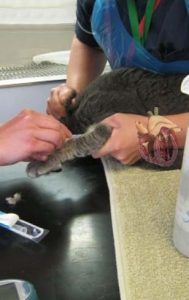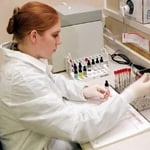Ron Hines DVM PhD


Heart Rate (Your Pet’s Pulse)
Your dog and cat’s heart rate seems like such an elementary thing. But it gives veterinarians like me a great deal of information when it comes to understanding your pet’s heart health.
You can hear or feel much of what your veterinarian hears through his/her stethoscope if you ask to borrow one. Simply put your ear against your pet’s chest while you feel its pulse in its groin. Without a stethoscope, you won’t hear typical heart murmurs unless they are quite severe. Your pet’s heart rate or rhythm felt in its groin (femoral pulse) provides considerable important information as well.
Your pet’s heartbeat and pulse should be strong and regular. It is normal for the rhythm of your dog and cat’s heart to change a bit in time with your pet’s breathing (normal sinus arrhythmia). That occurs to a lesser extent in healthy people. Heart rate and respiratory rate often go up or down together since both are adjusting to the dog or cat’s current oxygen needs through the vagus nerve.
Large dogs usually have somewhat slower heart rates than small dogs and cats; while puppies and kittens have a slightly faster pulse and heart rhythm. Erratic (arrhythmic) pulses and abnormally slow pulses (bradycardia) or weak pulses often exist together and share many common causes.
Reasons Your Pet’s Heart Rate Might Be Faster Than Normal (tachycardia):
Nervousness, fear or excitement are the most common causes for a fast heart rate in your dog or cat. That is especially true when your pet confronts stressful or uncertain situations – like a trip to your veterinarian’s office. “Stress-free” and “Fear-free” veterinary visits might be engineered to be stress and fear free for you. But they are never going to be for the majority of pets.
Exertion, pain, increased body temperature (such as heat stroke or fever), anemia, dehydration, shock (low blood pressure), congestive heart failure, cardiomyopathy, hyperthyroidism in cats, lung disease (e.g. pulmonary edema), air free in the chest (pneumothorax) or abnormal fluids in chest (hydrothorax) can all result in a faster heart beat and often a weaker femoral pulse.
Heartworm disease in dogs or in cats, advanced age, tracheal collapse, diaphragmatic hernias, or cardiac tamponade can have the same effect.
Pets in late pregnancy (particularly with large litters) or an overdose of medication (thyroid meds, catecholamines, amphetamine, caffeine, Sudafed®, theophylline, atropine overdose, etc.) also can raise your dog and cat’s heart rate.
All medications that are considered stimulants (like like caffeine, chocolate or ADHD medications) can increase your dog and cat’s heart rate when consumed accidentally or in excessive amounts. Too high a dose of thyroid medications (e.g. levothyroxine) can also cause increased respiratory rate. Other medications, like phenylpropanolamine (Proin®), that are given to older female dogs to control bladder leakage (and occasionally to cats as well) can elevate blood pressure but appear to have no effect on heart rate.
Reasons Why Your Dog Or Cat’s Heart Rate Might Be Slower Than Normal (= Bradycardia):
Reasons include: heart disease in cats and dogs, trauma to the head (as in “bell-ringer” car accidents), increased pressure surrounding the brain (hydrocephalus) can all affect the centers controlling your dog and cat’s heart rate. That problem is most common in apple headed miniature breeds. Read about that and other genetic birth defects here.
All forms of circulatory collapse, shock or coma can slow heart rate as well.
Canine athletes have slower heart rates than their couch potato relatives. That is nothing to worry about if your pet is healthy in other ways.
Situations of low body temperature (hypothermia), low blood sugar (hypoglycemia), sedative medications or terminal FIP disease in cats can all produce slow heart rates.
Elevated blood potassium levels (hyperkalemia), heart electrical circuitry failure (AV heart block, complete heart block), or hypothyroidism in dogs can cause a slower heart rate.
Overdose of many medications/sedatives (e.g. insulin, narcotics, general anesthetics, xylazine (Rompun®), digoxin, amlodipine and other calcium channel blockers, insecticides, propranolol and other beta-blockers, alcohol, neostigmine and other acetylcholinesterase inhibitors, etc.) will all slow your pet’s heart rate.
Some rare diseases such as “sick sinus syndrome” (especially in old miniature schnauzers) cause slow heart rate.
Benign sinus bradycardia (SB) occasionally occurs in dogs that have no apparent ill health. It appears to be due to a sinoatrial node abnormality present from birth. SB occasionally occurs in immature or young dogs, especially cockers, dachshunds, pugs, westies and miniature schnauzers.
Reasons Your Dog or Cat’s Heart Rate Might Be Erratic (= Arrhythmia, Dysrhythmia):
Stress can be the cause. But when it is not, interruption in the electrical signals that trigger your pet’s heart contraction (AV block, complete heart block, etc.) as well as all the causes listed in reasons for bradycardia (slow heart rate) can also cause erratic heart rate or pulse.
Electrolyte imbalances (hyperkalemia), inherited heart electrical conductivity (“wiring problems”), atrial enlargement due to cardiomyopathy or heart valve disease. Heart inflammation (myocarditis) can also cause an erratic heart rate or pulse.
Non-heart disease such as cancer, gastric (stomach) torsion or dilation, severe sudden trauma such as being hit by a car, two dogs in a fight or a cat mauled by a dog can affect pulse rhythm and rate as well. Read about kissing bugs below.
Kissing Bugs
Kissing bugs are becoming more common in the southern United States. The prime symptoms seen in many dogs that develop Chagas disease as the result of a bite from this creature are heart rate abnormalities and heart failure. Read about this disease here. At the time I wrote this, Seresto® flea and tick collars are probably the best way to decrease the likelihood that your dog will come in contact with these nasty bugs. (ref) The cat version of Seresto® does not have deltamethrin, so I do not know if it protects cats against these blood sucking insects.
Complementary Tests:
CBC/ WBC and blood chemistry panel, urinalysis, capillary refill time(= CRT), chest x-ray, electrocardiogram (EKG/ECG), proBNP test, thoracic ultrasound, echocardiogram, 24-hour heart monitor, In cats with a fast heart rate or dogs with a slow heart rate T4 for hyperthyroidism and hypothyroidism respectively.
DxMe



